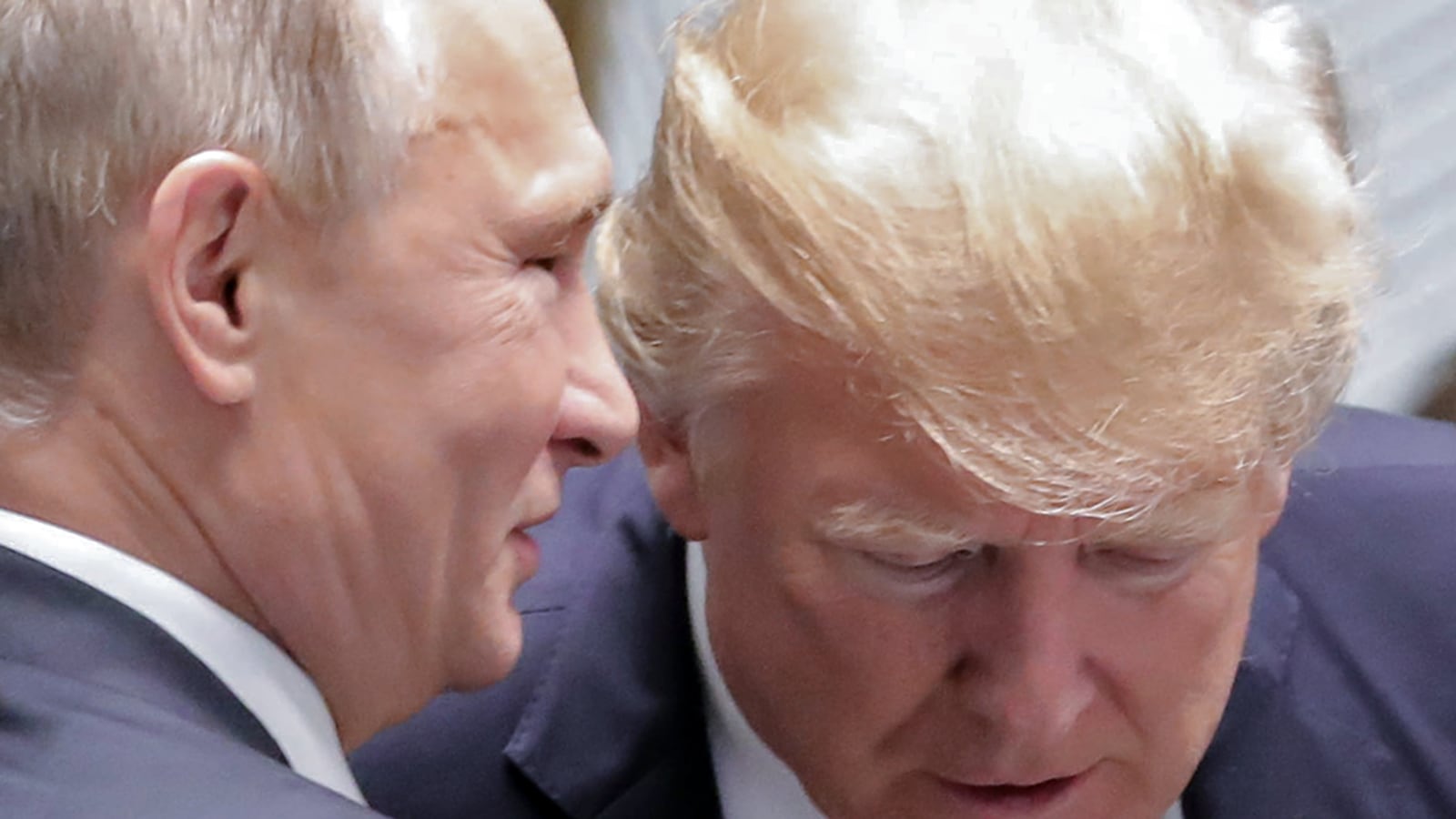Intelligence officials warned House lawmakers last week that Russia is interfering in the 2020 campaign to try to get President Donald Trump re-elected, The New York Times and The Daily Beast report. During the briefing to the House Intelligence Committee, Trump’s Republican allies reportedly challenged the conclusions of the intelligence community, arguing that under Trump the U.S. has been tough on Russia and strengthened European security.
But Russia’s state media—tightly controlled by the Kremlin—contradicts that assertion all the time. It has consistently conveyed the message that Trump’s election has proven exceedingly beneficial for the Kremlin.
Indeed, Trump’s presidency is so valuable for Vladimir Putin that even “tough” sanctions are minor by comparison. The Chekist in the Kremlin is willing to make temporary sacrifices in order to keep such a disruptive figure in charge of the mightiest country in the world, and Russian state media repeatedly makes the point that Russia’s gamble will continue to pay off, since the Kremlin is holding, as it were, the trump card.
Russian experts and pundits on state television frequently express their desire to see President Trump re-elected. Appearing on Russia’s popular state television news talk show 60 Minutes last October, political analyst Mikhail Sinelnikov-Orishak gushed: “I look at Trump and think: ‘May God grant him good health—and another term.’ This is a great situation for Russia... may he flourish and get re-elected... Trump is a great candidate. I applaud him... For America, this isn’t a very good president.”
Once Trump is re-elected—which, according to Russian experts and pundits, is a fait accompli—they expect U.S. concessions on every front, from the removal of sanctions imposed after Putin annexed the Crimean Peninsula and backed a separatist war in Ukraine, to restoration of access to diplomatic compounds the U.S. seized after Russia’s effort to murder a defector in Britain.
Appearing on a state TV show, The Evening With Vladimir Soloviev, last week, Russian politician Sergey Stankevich said Trump is “obligated” to accept Putin’s invitation to attend the Victory Day parade in Moscow this May. As he explained, “Trump owes us a serious debt… from back when he privately met with our president [Putin] in Helsinki one-on-one. They made a deal about creating working groups of entrepreneurs to discuss business, sanctions, de-escalating tensions, disarmaments, etc.”
Russian state media has taken Trump’s side at every turn and fully supported him throughout the impeachment. Kremlin-controlled news media outed the Ukraine whistleblower, referred to the U.S. president affectionately as “Donald Ivanovych,” “Trumpushka,” and as an “agent” of the Kremlin.
Normally, spymasters seek to shroud in secrecy their relations with those who wittingly or unwittingly serve their interests. But Russian state media openly gloats about the Kremlin’s influence over Trump, believing that he can endure the exposure without repercussions, and by flaunting the Kremlin’s sway with the White House, Russia further weakens U.S. democracy, which has always been one of its main pursuits.
Appearing on The Evening With Vladimir Soloviev in March 2019, Karen Shakhnazarov, CEO of Mosfilm Studio, noted: “They say Trump is making Russia great. That’s basically accurate… The chaos brought by Trump into the American system of government is weakening the United States... So when they say that Trump is weakening the United States—yes, he is. And that’s why we love him... The more problems they have, the better it is for us.”
Kremlin-controlled media offered their full-throated support for Trump’s pursuit of derogatory information that could be used to discredit former Vice President Joe Biden. State-television hosts not only helped to spread conspiracy theories about Biden and his son, but also threatened Ukraine, trying to push it toward complicity in Trump’s efforts.
In November 2019, the host of Russian news talk show 60 Minutes, Evgeny Popov, warned: “If Trump gets re-elected, and you don’t investigate Biden... [Ukraine] won’t get anything from America. Not a thing.” Two months earlier, Dmitry Kiselyov, the host of Russia’s most popular Sunday news program Vesti Nedeli urged Trump to keep digging in Ukraine for “the sweetest” kompromat of all: “Proving that Ukraine—not Russia—interfered in the U.S. elections.”
The resulting situation presents a boon for the Kremlin on multiple fronts: fraying confidence in the integrity of the U.S. elections and the rule of law in America, combined with the weakening of U.S. relations with Ukraine, as well as with other strategic partners and allies.
The pursuit of “Biden dirt” is widely seen in Russia as a successful operation. Last week, pundits and experts on the Soloviev show described Joe Biden as a “political corpse,” openly hoped that Mike Bloomberg would run as a third-party candidate.
They also said President Trump should wish the best of luck to presidential candidate Bernie Sanders, whose candidacy brings “nothing but joy” for the incumbent.
Reporting for channel Rossiya-1’s Saturday News Show on Feb. 8, Valentin Bogdanov pegged Sanders as an ideal opponent who can be taken down easily by Trump. The host of the program, Sergey Brilyov, surmised that “Socialist Sanders” simply “can’t compete” with the current occupant of the White House.
This month, Izvestia, which was formerly the newspaper of record in the Soviet Union, described Trump as “the only real contender” in the upcoming presidential election. Konstantin Blokhin, research fellow with the Russian Institute for Strategic Studies, told Izvestia that in spite of his popularity, Sanders can’t win, because he is too old and too radical for most Americans.
Appearing on The Evening With Vladimir Soloviev this month, political scientist Dmitry Evstafiev concluded that barring unforeseen circumstances, Trump “already won his re-election.”
Last year, following the release of Special Counsel Robert Mueller’s report, Popov, the 60 Minutes host, promised: “Soon, we will help you elect Trump once again. Just like the last time. Get ready!” After the conclusion of the impeachment hearings this month, Russian state television channel Rossiya-1 host Artyom Sheynin exclaimed: “Trump forever!” and asked: “Is America finished?”
The continued pro-Trump tendencies of the Russian state media stand in sharp contrasted to its virulent anti-American propaganda. While the Trump presidency is considered to be highly beneficial for the Kremlin, the United States remains Russia’s biggest adversary. Trump is therefore seen as one of the best tools the Kremlin has in its efforts to undermine, discredit, and ultimately destroy the American way of life. And Russian state media openly praises Trump’s authoritarian tendencies, predicting civil war in the United States in the event he is not re-elected.
Russian experts and pundits also have divined that a Trump dynasty will rule the United States for decades to come, with the president’s children following in his footsteps.
Appearing on Sunday Evening With Vladimir Soloviev this month, Konstantin Zatulin, a leading figure in Putin’s United Russia party, said that Russia has been fighting “information wars” against the West for the longest time, but now they’re much more technologically advanced.
During the same show, Boris Yakemenko, one of the chief architects of the pro-Kremlin youth movement Nashi, asserted that World War III between the United States and Russia is already in progress and is playing out in social media.
This fits with the reported conclusions of the U.S. intelligence community that “the Russians have been preparing—and experimenting—for the 2020 election... They have made more creative use of Facebook and other social media. Rather than impersonating Americans as they did in 2016, Russian operatives are working to get Americans to repeat disinformation.”
The task of getting Americans to repeat the Kremlin’s talking points is an easy errand from the standpoint of the Russian state media. Back in 2017, Margarita Simonyan, editor-in-chief of Russia’s state-controlled broadcaster RT (formerly Russia Today), described Americans as poorly educated and ignorant. Simonyan concluded: “They’ll believe anything!”
The Russian state-operated news agency RIA Novosti recently noted that suspension of disbelief is easy, since “only one in six Americans can find Ukraine on the map, only one in four can find Iran, and about a quarter of American voters aged 24 to 35 are not sure that the Earth is round.”
Perennially insulted by the descriptions of Russia as “a gas station masquerading as a country” or “Zimbabwe with nukes” because of its economic dependence on oil production and its well-armed autocracy, the Kremlin’s mouthpieces inadvertently reveal the reasons for boasting about election interference and other anti-Western active measures. This month, Ivan Danilov wrote for RIA Novosti that Russia—“the country that ‘organized Brexit’ and ‘elected Trump’—is by definition “a global hegemon.”
Such remarks have a purpose in state policy. As Trump’s former Russia adviser, Fiona Hill, testified in October 2019 the Kremlin often sends signals “publicly through the press and through press articles—that’s the way that they operate.”
When the Russian state media openly brags about interfering in the U.S. elections, the desired effect is akin to showing off Russia’s new and purportedly “invincible” high-tech weapons of war. This month Russian Foreign Minister Sergey Lavrov asserted that “Russia’s foreign policy concept since 2000 has made it possible for us to develop principally new qualities on the international arena, to restore our status as a great power.”
The Kremlin wants to be perceived as a force to be reckoned with, fostering an atmosphere devoid of accountability for Russia’s human-rights violations, foreign invasions, land grabs, and assassinations. In the style of “fake it till you make it,” Putin is determined to persuade the world that resistance is futile and the Kremlin is omnipotent.
Every denial of Russian election interference coming out of the White House brings Putin one step closer to the fulfillment of his goals. Every election-security bill that is blocked by the GOP in the Senate gives advantage to our foreign adversaries—and they are not sick of winning.







